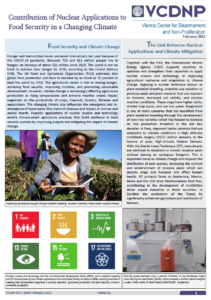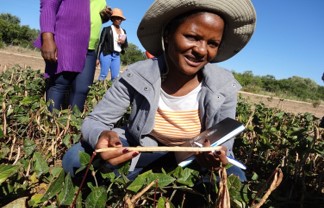
 The agriculture sector is vital to ending global hunger, however climate change is increasingly affecting agriculture production as rising temperatures and extreme weather events impact negatively on the productivity of crops, livestock, forestry, fisheries and aquaculture. The changing climate also influences the emergence and re-emergence of insect pests that transmit diseases and impact on human and animal health. Peaceful applications of nuclear science and technology enable climate-smart agriculture practices that build resilience in food security systems by improving outputs and mitigating the impact of climate change, thereby helping countries to achieve the UN Sustainable Development Goals.
The agriculture sector is vital to ending global hunger, however climate change is increasingly affecting agriculture production as rising temperatures and extreme weather events impact negatively on the productivity of crops, livestock, forestry, fisheries and aquaculture. The changing climate also influences the emergence and re-emergence of insect pests that transmit diseases and impact on human and animal health. Peaceful applications of nuclear science and technology enable climate-smart agriculture practices that build resilience in food security systems by improving outputs and mitigating the impact of climate change, thereby helping countries to achieve the UN Sustainable Development Goals.
Drawing on a panel discussion on this topic organized by the VCDNP, the fact sheet focuses on two climate-smart nuclear techniques that are commonly applied using radioactive sources, namely plant mutation breeding and the sterile insect technique. Security and transport concerns related to these sources are making them more expensive and increasingly inaccessible. The fact sheet highlights some of the measures that can be taken to ensure continued and expanded use of these applications especially by low-and middle-income countries.
Read the fact sheet


